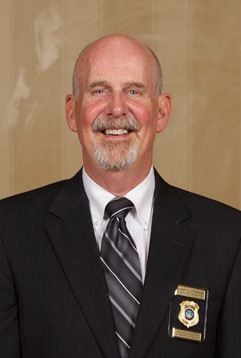
By OWEN MCCARTHY
Capital News Service
LANSING – Sarah Krebs, who has worked for the State Police for over 20 years, took her current position because no one else in the 3,000-person department wanted the job.
She serves as the department’s chief diversity, equity, and inclusion, or DEI, officer.
That role came into existence in 2019 when an executive order from Gov. Gretchen Whitmer mandated that each state department designate a DEI officer.
One of Krebs’ main responsibilities is to administer a training program for troopers called “Race and the History of Policing.”
The class is 1½ hours long and discusses the nation’s history with race and how it relates to the modern day, specifically in the context of law enforcement.
It draws on examples of police shootings in Michigan, discusses how redlining of housing in neighborhoods has led to socio-economic imbalances and how historical discrimination may contribute to higher crime rates in communities of color.
Unlike past anti-bias programs, the trainers have a law enforcement background and can draw on their lived experiences to more effectively engage with trainees.
However, Krebs said that doesn’t mean all troopers are on board with the training.
“I definitely had to learn the hard way that I need to set some ground rules in any DEI training,” Krebs said. “It’s permissible for them to ask questions, but they have to come from a place of education. You can’t just be asking because you want to be an a——.”
Col. James Grady II, the State Police director, echoed the observation that some troopers don’t welcome such training.
“Some people just don’t like it,” Grady said. “But I’d tell them that you have to have an open mind. Exposure and education will help a lot to reduce the biases for a person, but you got to know what your biases are.”
Krebs, a third-generation police officer, said one way to get trainees to have an open-mind in the discussions is by emphasizing her own law enforcement background. She has worked as a trooper, a first lieutenant, a forensic artist and held other positions throughout her 20-plus-year career.
“That’s law enforcement in general,” Krebs said. “You have to have a foot in the door to be credible with them.”
“When I show the students that I’m not just up here slinging information at them, that I actually did this, I live this, it helps to disarm them. But you’re not going to reach everybody,” Krebs said.
In 2021, the State Police partnered with researchers at Michigan State University’s School of Criminal Justice to determine whether racial disparities were present in traffic stops by troopers.
The researchers found significant disparities.
To address the problem, the department employed an outside consulting firm, CNA, to assess its practices, as well as make findings and suggestions.
One finding related to anti-bias training given in recent years and said the “History of Race and Policing” course is an upgrade from past training courses.
According to the consultant report, officers overwhelmingly felt attacked by the approach of the former training, which they asserted “painted all police as racist due to racial bias as a systemic phenomenon.”
The new training is given to smaller groups of around 15, which allows for more “intimate” open discussion and presents the information in a more “neutral” manner, the consultant report said.
Krebs said the sessions are most constructive when the trainees are racially and culturally diverse, but that can be difficult to ensure, given the demographics of the department.
As of Nov. 11, 2023, about 82% of enlisted personnel were white men, according to the department’s demographic report.
In 2020, the then-Republican-controlled Senate unanimously passed a bill that would require implicit bias and de-escalation training for all police officers. The bill died in the then-Republican-controlled House.
The Senate’s vote came 10 days after George Floyd, an unarmed Black man, was killed by a white police officer in Minneapolis, sparking national outrage and protests against police brutality.
Bob Stevenson, the executive director of the Michigan Association of Chiefs of Police, opposed the bill at the time.
While he said he believes anti-bias training is necessary for police officers, he opposes state-mandated training, especially when it is not accompanied by more funding to cover the added costs.
“I firmly believe that (the legislators’) hearts were in the right spot, and they were trying to do the right thing,” Stevenson said. “But it’s really a futile effort because no department is going to do it because they don’t have the money to pay for it.”
According to the Senate Fiscal Agency analysis of the 2020 bill, there would have been a $22.8 million annual impact on the state Commission on Law Enforcement Standards, the body setting employment standards for police officers.
He also said legislation mandating specific training can restrict agencies from implementing newer types of anti-bias training that may be more effective.
“We oppose (the Legislature) micromanaging the profession,” Stevenson said.
One of the police chiefs’ association priorities is to get agencies accredited, he said. To do so, they must have a written policy that prohibits biased policing practices and mandates anti-bias training.
He said accreditation increases the public’s trust in law enforcement because it’s an “open” and “transparent” program.
“There isn’t a part of accreditation that’s secret,” Stevenson said. “Every citizen can look and see if they live in a city that’s accredited, and they can see exactly what (the agency) has policies on.”
Currently, Stevenson said, 70% of agencies in the state are either already accredited or actively working toward it.

Michigan Association of Chiefs of Police.
Bob Stephenson, executive director of the Michigan Association of Chiefs of Police.